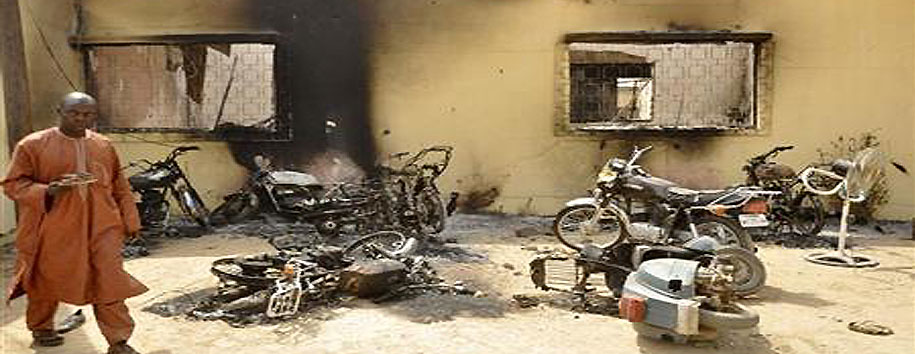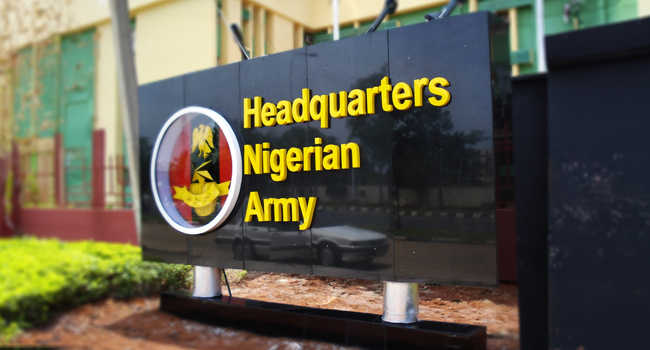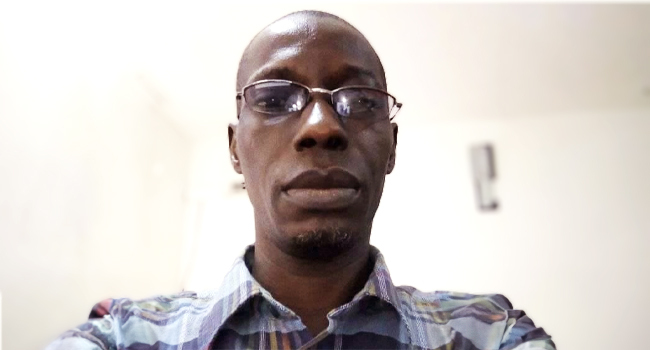Gunmen suspected to be members of the radical Islamist sect, Boko Haram have killed at least four people – including a 7-year-old girl – in recent attacks in Yobe state, army and police said on Monday.

In the city of Potiskum, gunmen opened fire on a policeman and his family, killing the policeman’s 7-year-old daughter, the Police Public Relations officer of the Yobe State command, Toyin Gbadegeshin said.
“They fired shots at him while sitting in the midst of his family. He managed to avoid the bullets and scaled over the fence,” Mr Gbadigisin said.
“The gunmen shot dead his seven-year-old-daughter and seriously injured another 12-year-old daughter and a 10-year-old-son who are now in hospital.”
The police spokesman blamed Boko Haram, a group waging an increasingly bloody fight with the Nigerian security forces, for the attack.
Borno attacks
Early on Monday, gunmen killed three people when they attacked a police station, a church and a bank in the border town of Dikwa in Borno state.
The Spokesman for the Joint Security Task Force (JTF), Lt. Col. Sagir Musa said a local politician, a police officer and civilian and three gunmen were killed in the attack which occurred at about 1.30am on Monday morning.
The Army spokesman blamed the attack on members of the Boko Haram sect.
“Three Boko Haram terrorists were killed and many escaped with bullet wounds,” he said.
These attacks follow a Sunday suicide bombing in Kaduna. That attack killed at least 38 people in a massive blast that rattled a city long at the centre of religious, ethnic and political violence in the nation.
While no one immediately claimed responsibility for the attack, suspicion immediately fell on Boko Haram. Some fear the attack could further inflame tensions around Kaduna, a region on the dividing line between Nigeria’s largely Christian south and Muslim north.
Here are some facts about Boko Haram
THE GROUP
* Boko Haram became active in about 2003 and is concentrated mainly in the northern Nigerian states of Yobe, Kano, Bauchi, Borno and Kaduna.
* Boko Haram, which in the Hausa language of northern Nigeria means “Western education is sinful,” is loosely modelled on the Taliban movement in Afghanistan.
* The group considers all who do not follow its strict ideology as infidels, whether they be Christian or Muslim. It demands the adoption of sharia, or Islamic law, across Nigeria.
* Boko Haram followers have prayed in their own mosques in cities including Maiduguri, Kano and Sokoto, and wear long beards and red or black headscarves.
* The group published an ultimatum in January 2012 giving Christians three days to leave northern Nigeria. Since then, attacks in northeastern Nigeria have killed many and hundreds of Christians have fled to the south. President Goodluck Jonathan declared a state of emergency on Dec. 31 in an effort to contain the violence.
* Human Rights Watch said in January that the sect had killed at least 935 people since 2009.
* Jonathan said the violent sect had supporters within his own government and the insecurity the group had created was worse than during the civil war that broke out in 1967 and killed more than a million people.
* In a recent success, Nigeria arrested the purported spokesman for Boko Haram on Feb. 1, known as Abu Qaqa.
* Abu Qaqa, a shadowy figure and purported spokesman for Boko Haram said on March 20 it had “closed all possible doors of negotiation” with a government of “unbelievers” that it cannot trust, and called on Muslims to join the fight against it.
MAJOR ATTACKS BY BOKO HARAM:
* In its first attack in Jan. 2004, it attacked a town in Yobe State before being forced to withdraw by security forces.
* In July 2009, Boko Haram staged attacks in the northeastern city of Bauchi after the arrest of some of its members, and clashed with police and the army in Maiduguri. About 800 people were killed in five days of fighting in the two cities. Later that month, sect leader Mohammed Yusuf was captured by Nigerian security forces and shot dead in police detention hours later.
* In early July 2010, Abubakar Shekau, a former deputy leader of the sect who was thought to have been killed by police in 2009, appeared in a video and claimed leadership.
* On Aug. 26, 2011 a suicide bomber struck the U.N. building in Abuja. At least 23 people were killed and 76 wounded. Boko Haram claimed responsibility on Aug. 29, demanding the release of prisoners and an end to a security crackdown aimed at preventing more bombings. It was the first known suicide bombing in Nigeria.
* An attack on St. Theresa’s Catholic church in Madalla on Abuja’s outskirts during a packed Christmas mass, was the deadliest of a series of Christmas attacks on Nigerian churches and other targets by the sect. At least 37 people were killed.
* On Jan. 20, 2012 coordinated bomb and gun attacks on security forces in the northern city of Kano killed at least 186 people in the group’s most deadly attack.
* On Feb. 26 a suicide bomber drove a car packed with explosives into a church in Jos, killing two people. Reprisals soon followed and Christian youths killed at least 10 people in Jos days later.
* On Easter Sunday a bomber tried to drive a car packed with explosives into a church compound in northern Kaduna during an Easter Sunday service. However the car was stopped and the driver turned back. The bomb exploded by a large group of motorbike taxi riders, the police and witnesses said. At least 36 people were killed and 13 critically injured.




